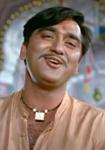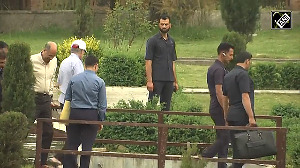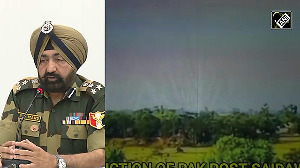'She showed courage at every turn in her political career.'
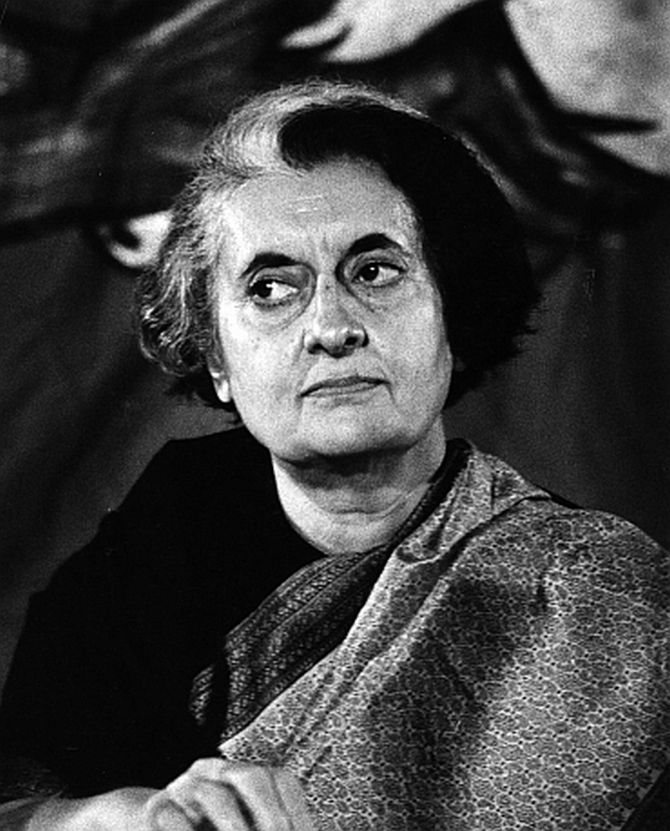
Neerja Chowdhury, the veteran political journalist, has just published How Prime Ministers Decide, revealing how major decisions that affected India were taken by six prime ministers -- Indira Gandhi, Rajiv Gandhi, V P Singh, P V Narasimha Rao, Atal Bihari Vajpayee and Dr Manmohan Singh.
Syed Firdaus Ashraf/Rediff.com asked Neerja Chowdhury about her assessmennt of each prime minister and their impact on the Republic.
The first of a two-part interview:
Indira Gandhi: The good decisions
As I travel today and meet younger people I ask them who is their favourite prime minister (amongst the ones I have written about). And I find the choice of young women in particular is Indira Gandhi -- even four decades after she died.
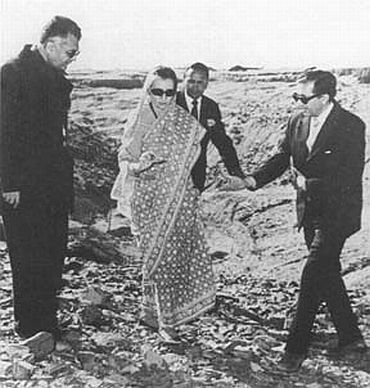
I was recently at a village in Satara, Maharashtra, and asked around a dozen 16-17 year old girls the same question. Without a moment's hesitation, they all said in one voice, Indira Gandhi.
The fascination for Indira Gandhi continues because from a 'gungi gudia' she became a powerful leader who got the better of her opponents -- internally and externally.
She went in for the Green Revolution to make India self-reliant in food, she helped to create Bangladesh by weakening Pakistan, and changing subcontinental realties.
She showed courage at every turn in her political career.
When the old guard within the Congress thought she would be pliant in their hands, she turned the tables on them and became the claimant of the real Congress -- and a mass leader.
Indira Gandhi set the benchmark for a strong leader not only in India, but also outside the country.
Indira Gandhi: The bad decisions
The bad thing about Indira Gandhi was how she scuttled democratic rights. During the Emergency, she suspended fundamental rights, imposed press censorship, and imprisoned Opposition leaders.
During 1977-1980. she used every trick in the book, going to any extent to return to power.
She crossed the Lakshman Rekhas, which her father Jawaharlal Nehru had not done.
She once told a politician from Uttar Pradesh, 'Mera baap sant tha, main nahin hoon (my father was a saint, not me).'
How she got back to power in 1980, having been routed in 1977, using saam daam dand bhed, is also a fascinating story of another side of Indira Gandhi which I have explored in the book.
And how her younger son Sanjay Gandhi, who was responsible for her defeat in 1977, became her crutch for her return to power.
An aide of Janata Party leader George Fernandes had admitted that Sanjay had a 'Machiavellian mind', which no one on the Janata side could match.
Rajiv Gandhi: The good decisions
Rajiv Gandhi burst on the political scene as a young, forward-looking leader in 1984.
When he became the prime minister, the mood in the country underwent a change from the gloom after his mother's assassination and the anti-Sikh riots that followed it, to hope.
He immediately started tackling the problems that had for long beset the country -- and dogged his mother's steps.
He signed the Punjab Accord (to end militancy), then the Assam Accord, followed by an accord in Mizoram.
Rajiv wanted to take India into the 21st century.

He lowered the age of voting to 18.
He enacted an anti-defection law to stop the practice of 'aaya rams and gaya rams' that plagued Indian politics.
He started the process of empowering Panchayati Raj institutions, though the bills were passed during P V Narasimha Rao's time.
And he set up six technology missions, setting in motion a communication revolution.
Not many people know that even as Rajiv talked of nuclear disarmament, he had given instructions to move towards weaponisation as early as 1985 -- and not in 1989, when he gave the final go-ahead.
When Rajiv visited the United State in 1985 and met (then US president) Ronald Reagan, he was told by Reagan that Pakistan already had a nuclear bomb. When Rajiv started to talk about disarmament, Reagan told Rajiv, 'Don't talk theory, think of your own protection.'
- MUST READ! Why Rajiv Gandhi decided on nuclear weapons
Rajiv Gandhi: The bad decisions
Rajiv was politically naïve, and inexperienced. He could not understand the hold caste and community had on the Indian psyche.
The way he handled the Shah Bano judgment -- giving alimony to an old, divorced Muslim woman -- finally led to the undoing of the massive mandate he had got in 1984, and he came down from 414 (Lok Sabha ) seats to 197 in 1989.
He nullified the Supreme Court judgment on Shah Bano by bringing a law in Parliament -- the Muslim Women's Bill, under pressure of the Muslim community. By doing so he sent a message that you could undo a court judgment by a law under public pressure. It was then that the word 'appeasement' gained currency in Indian politics.
'Appeasement' is one of the three issue that Prime Minister Narendra D Modi has recently flagged -- along with 'corruption' and 'family rule' -- and it is clear that the BJP intends to use these as its election themes in 2024. The PM spoke about it during the recent no confidence motion against his government, and also from the ramparts of Red Fort on Independence Day.
After the Shah Bano case, Arun Nehru sold the idea to Rajiv Gandhi that to balance what he had done for the Muslims, he should do something to placate an agitated Hindu community -- and this was behind the opening of the locks (for direct darshan of Lord Ram) at the disputed Babri Masjid-Ram Janambhomi structure in February 1986. But Rajiv Gandhi fell between two stools and won neither community,
Rajiv Gandhi's twin decisions gave an impetus to the BJP -- and led to the rise and rise of the party in the years that followed with the BJP making the construction of a Ram temple its main plank.
V P Singh: The good decisions
V P Singh brought in the Mandal Commission's recommendations to give job reservations to the OBCs -- and there are two views on this most controversial decision of Singh's political career.
Mandal, I feel, was waiting to happen, given the rise of the OBCs from the mid-sixties onwards.
It was Morarji Desai's government which appointed the Mandal Commission. Indira Gandhi put it on the backburner after she got re-elected in 1980.
V P Singh adopted the Mandal Commission's recommendations to save his beleaguered government. Devi Lal, his deputy prime minister, was on the warpath against V P Singh and would have demanded the implementation of the Mandal Commission.
The biggest contribution of V P Singh was the empowerment of Other Backward Classes, and it spawned OBC leaders who ruled their states for over a quarter of a century after that -- Mulayam Singh Yadav, Laloo Yadav, Nitish Kumar, Uma Bharti, Shivraj Chouhan, Ashok Gehlot, and many more.
Today we have an OBC prime minister.

Affirmative action in favour of the OBCs is a reality which no prime minister after V P Singh could reverse.
As power moved downwards, you have the Most Backward Castes amongst the OBCs, the MahaDalits amongst the Dalits, the Pasmanda Muslims among the Muslims demanding their share of the pie today.
The communities that were on the periphery of the power structure (before Mandal Commission), are not satisfied withtokenism in politics. They want their share in the power structure and fruits of economic progress.
Another change V P Singh brought and he used to consider this as one of his achievements -- was to bring the regional parties to the national stage, and they became part of the national government.
And thirdly, he created a national alternative to the then dominant Congress party, which no other leader who had quit the Congress (like Mamata Banerjee, Sharad Pawar or Jagan Reddy) had been able to do.
V P Singh: The bad decisions
V P Singh dealt a body blow to the Congress from which India's grand old party has not been able to recover.
The same Mandal decision which empowered the OBCs degenerated into casteism, not social justice it was intended to bring about.
People have become very conscious about their caste and everything has become caste-based, which all political parties have to take note of it.
- Part II of the Interview: Was Narasimha Rao India's Best Prime Minister?






